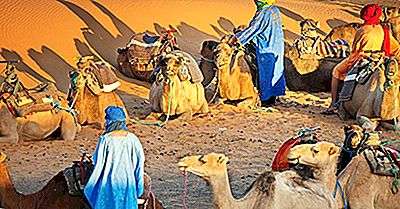Arab and Berber cultures go back several centuries in the history of the nation and largely define what we consider today as “Moroccan” lifestyles. The Berbers are the indigenous residents of Morocco. The Arab peoples arrived in the 12th century and conquered the country. As a result, they infiltrated all sectors of the country and controlled the political, cultural and social way of life of Moroccans. Today, the Arabs and the Berbers mix closely and bilingualism is a common characteristic of modern Morocco. The Jewish community played an important role in the economic life of Morocco until their number began to decrease. The other groups in Morocco are Europeans, Sub-Saharan Africans and Gnawa.
Historic village of Morocco
The native Berbers lived in Morocco more than two millennia before the Phoenicians colonized the country in the 8 th by 6 th centuries BC Before the 3 rd century BC, Carthage reigned over the coastal areas while the native monarchs ruled ‘countryside. In 40 AD, the Roman Empire annexed part of present-day Morocco. In the middle of the 5 th century AD, the Vandals invaded the country until the 6 th century when the Byzantine Empire took over. In the last phase of the 7 th century, the Muslim invasion of Morocco began. In the 8 thCentury AD, the Arabs conquered the country and the Umayyad caliphate ruled Morocco. The Arabs imposed their will on the cities, which then grew up under their patronage, as did the agricultural areas. Sedentary Berbers join the Arabs in search of protection against their nomadic homos. During the Berber revolution of 740, the country separated from the tyranny of the Caliphate of Baghdad after the Abbasids replaced the Umayyad Caliphate. However, half a century later, the Idrisid dynasty established the Moroccan state. When Idris’ son and heir died, Morocco dissolved into unimportant principalities. Tangier, the last territory was captured by the state of Cordoba in 929. From 1549 to 1659, the Saadi dynasties invaded and ruled Morocco. The Alaouites, the reigning dynasty of Morocco took power in 1667. Europeans settled in Morocco in the early 1900s. By 1912-1956, Morocco was colonized by French and Spanish administrations. The Arabs had the most influence on the cultural and demographic aspects of the country.
Arabs
The Arabs came to Morocco at the end of the 12th century, in the name of Allah and for the dissemination of Islamic teachings. The Arabs swept the Middle East and North Africa, spreading the religion in Morocco. After settling in, they assimilated the Berber community, formerly Christian, and converted it to Muslims. In the war on the Iberian Peninsula, the Arabs and the Berbers fought as Muslims. Today, most Moroccans identify with both Arabic and Berber. Only a few Arabs, especially the Shereefs, who date back to the Prophet Muhammad, claim to be pure Arabs.
Berbers
The Berbers are the indigenous peoples of Morocco. They have lived in Morocco for more than four millennia. They are called Amazigh and for centuries they fought the Roman, Arab and French invaders. The Berber language is more oral than written, although scripts as old as 2500 years containing their writing system are available. Before the Arab invasion, the Berbers were Christian or Jewish. When the Arabs settled in Morocco, they converted to Islam.
Gnawa
The Gnawa came from what was, in Antiquity, the Empire of Ghana of Ouagadougou, which reigned today over Senegal, Mauritania, Burkina Faso, The Gambia and 85% of Mali. The ethnic community has become an integral part of the Sufi order in the Maghreb, present-day Morocco. They adopted Islam but continued to practice possession, a kind of dance, during the rituals. Gnawa’s music mixes classical Islamic Sufism with pre-Islamic African traditions. In Moroccan culture, the Gnawa are considered experts in the treatment of psychological disorders, scorpion stings, the use of colors, scents, fear and the condensed cultural image.
Europeans
Europeans, also known as white Moroccans, are Moroccans of European origin, most often of Spanish descent. Europeans settled in Morocco under French and Spanish domination around 1912-1956. Before independence, more than half a million Europeans lived in Morocco. The European population represented almost half of the total population of Casablanca. After the country’s independence in 1956, the European population declined. Today, Europeans represent only 1% of the total population.
Jews
After the destruction of the First Temple in Jerusalem, many Jews emigrated to Morocco and settled among the Berbers. More Jews came to Morocco before and after the Alhambra Decree 1492. This second wave of immigrants deeply influenced the Moroccan Jewish community and soon they embraced the Andalusian Sephardic liturgy and the Moroccan Jews began to identify with the Sephardim. By the 1940s, the Jew had exceeded 250,000, but Operation Yachin reduced this population to about 5,000. Since that time, many Moroccan Jews have emigrated to Israel.
Sub-Saharan Africans
The inhabitants of sub-Saharan Africa have emigrated to Morocco since antiquity. During the slave trade, Morocco’s position on the coast became a hub for Arab traders. In addition, some people may be fleeing drought and famine in the Sahel region when they arrived in Morocco. Today, the country’s proxy to European countries attracts many Sub-Saharan Africans who are eager to move on. However, strict immigration bans imprison many people in Morocco. The majority of Sub-Saharan Africans in Morocco come from South Africa, approximately 2,100 and Côte d’Ivoire with 1,800.
Relations between ethnic groups in Morocco
Since most Moroccans are Muslim, most of these people can interact and have mutual relationships as fellow Muslims. Generally there is peaceful coexistence between Muslim communities, regardless of their ethnic origin. However, there have been cases of discrimination against the black African community living in Morocco. The peoples of the southern Sahel region are often seen as less important communities. However, in recent years, the Moroccan government has decided to provide these Sub-Saharan Africans living in Morocco with more extensive citizenship rights.

